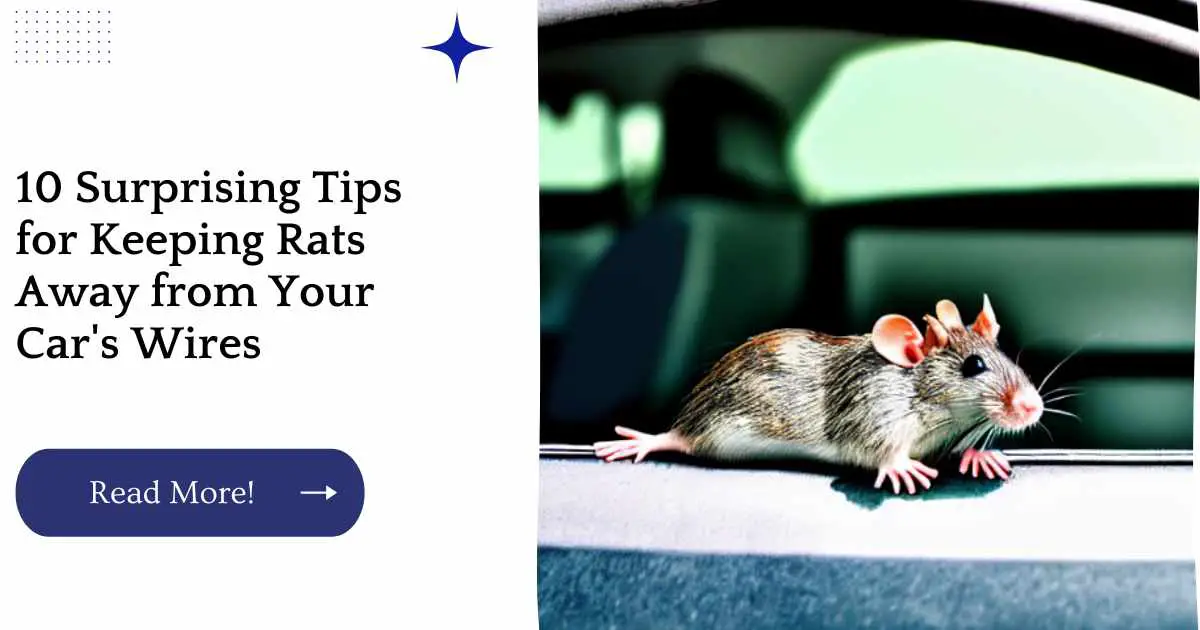Rats are a major problem for car owners everywhere, and if you’ve ever had to deal with them in your own garage, then you know just how frustrating it can be.
They crawl into spaces where they can’t be seen and chew through wires, causing them to short out or even catch fire.
Not only is this dangerous for your vehicle and expensive to repair but it also creates a serious health hazard when fumes from burning wiring fill the air around your vehicle’s engine compartment.
| Key Takeaways |
|---|
| Rats can cause significant damage to cars by chewing on wires and other components. |
| There are several methods you can use to prevent rats from accessing your car, including sealing access points and using repellents. |
| Regular cleaning can also help keep rats away by removing food debris and other attractants. |
| If you suspect your car has already been damaged by rats, it’s important to have it inspected and repaired as soon as possible. |
| Additional resources, such as websites and articles, can provide helpful tips and information on how to prevent rodent damage to your vehicle. |
Lethal Rat Traps
Rat traps are one of the best ways to catch a rat. Here’s how to use them:
Place the trap where you have seen signs of rats or along their known paths. For example, if you find droppings in an alleyway behind your home, set up traps there, too. If you notice that they’re coming into your garage through an unused door or window, set up traps in those areas as well.
Rats will often return to locations where they’ve previously found food making these spots ideal for trapping them!
Use peanut butter on bait plates only; do not use other types of bait (such as cheese) because it can cause injury to non-target animals and children who may come into contact with it later on down the line if not disposed properly first thing Monday morning (which is always a struggle).
Make sure the bait is fresh by replacing it weekly so that freshness doesn’t affect its effectiveness either–you’ll know what I mean when we get there later on this list!
Worried about rats chewing on your car wires? Don’t let them win! Follow these effective tips mentioned in our article on Rats Chewing on Your Car Wires? Here’s How to Stop Them and say goodbye to the pesky rodents!
Moth Balls
Moth balls are one of the most common methods used to repel rats, but they can be very dangerous. They are toxic to humans and pets, so you want to keep them out of your car as much as possible.
Moth balls should only be placed in areas where there is no direct contact with any body part or clothing—like the trunk or engine compartment.
Moth balls can also be used in wheel wells, under floor mats and even in a bucket of water near the door jambs where rats like to enter cars from outside sources like nearby trees or shrubs.
Peppermint Oil
Peppermint oil is an excellent way to keep rats away from your car’s wires. This natural repellent can be added to a cotton ball and placed in the engine compartment, or it can be sprayed on your wires and engine block.
Don’t let rats invade and damage your car! Our article on Save Your Car from Rat Invasion with These Proven Prevention Methods shares some effective prevention tips that can help you keep these rodents at bay
Spring-Loaded Rat Traps
Riddex, a device that emits an electrical field from the ground up and is supposed to keep rats away, has gained popularity in recent years. But some experts say it’s fake science backed by questionable claims.
In fact, Riddex may even be harmful to your health—and here’s why:
Riddex uses electromagnetic waves to prevent rodents from entering your home. They claim that these waves interfere with their ability to produce offspring, but there’s no evidence that this is true.
In fact, electric fields are known to cause tumors in lab animals who were exposed for long periods of time (and these results aren’t necessarily transferable).
Even if they were safe for humans and pets when used briefly as directed by the manufacturer (which is not clear), there’s still no proof that Riddex works at all!
The traps are reusable too making them cheap enough so anyone can afford them! Plus you won’t need any chemicals such as those found on rat poison since these can be dangerous if children or pets find them while playing around outside.
| Type of Trap | Description |
|---|---|
| Snap traps | Simple, cost-effective, and easy to use traps designed to quickly catch and kill rodents. |
| Electronic traps | High-tech traps that use a jolt of electricity to kill rodents instantly. |
| Glue traps | Sticky traps that capture rodents alive, allowing you to release them into the wild or dispose of them. |
| Multiple-catch traps | Traps that can catch and hold multiple rodents at once, without killing them. |
| Live-catch traps | Traps designed to safely catch rodents alive, allowing you to release them into the wild |
Glue Traps
Glue traps are a humane way to catch rats. They’re also effective at keeping them away from your car’s wires, as long as you use enough glue.
The key is to have enough glue to trap some rats for several days, so that they don’t have time to gnaw through the wire and make it into an escape route for their friends.
If you live in a garage or carport where there aren’t any pets or small children around, then glue traps are great for catching rats in these spaces too you’ll just want to avoid using the really big ones because they can get stuck in tight places where they can’t be easily retrieved (like under your car). If this sounds dangerous and gross? Well then maybe try something else!
Looking for ways to prevent rats from getting into your car? Check out our article on How to Keep Rats Out of Your Car: Find Out and learn some practical tips that can help you protect your vehicle from the destructive rodents
Rat Poison
Rat poison is, unfortunately, a tempting option for many people because it’s so readily available. But rat poison is dangerous to both humans and pets and it’s not a long-term solution.
Rats who eat rat poison may die outside your car rather than inside where they could cause damage to wiring or other parts of the car. Also, rat poisons can be expensive.
Cats
Cats: If you have a cat, consider keeping it in the garage with you. Cats are natural predators of rats and can be trained to chase them away from your car’s wiring. In some cases, they may even attack rats on sight.
Car Washing: The best way to keep rats away from your vehicle is by regularly washing it—not only will it be easier to see any signs of damage as soon as possible, but the strong scent from your soap will also deter them from coming near your car in the first place!
Keep Your Car Garaged Or Covered At All Times
- Keep your car garaged or covered at all times.
- Keep the garage door closed.
- Keep the garage clean. Don’t let garbage pile up, and don’t leave food in there either—rats love to eat!
Clove Oil-Soaked Cotton Balls
If you’re looking for an all-natural way to keep the rats away, look no further than clove oil. Cloves are a naturally occurring substance with a strong odor that most rodents find unbearable in fact, some studies show that rats avoid places where there is clove oil present.
Just place cotton balls soaked in clove oil around your car’s engine bay and drive shafts (or any other area of your car where you suspect rats may be nesting).
You can also put them under the hood and inside each tire if needed. Reapply as necessary the more often the better!
Did you know that you can give your pet rats a bath? Our article on How to Bathe Rats: Explained provides a step-by-step guide that can help you keep your furry friends clean and healthy.
Crisco And Pepper
You can also use Crisco and pepper. Stir together a little bit of the former with three times as much of the latter, and then apply to your car’s wires.
The rats will hate it so much they’ll go elsewhere to make their nests!
If you want to get even more creative with deterrents, try applying plain old talcum powder or chili powder (it’s okay if the rats try it; they won’t like it) around your car’s wires. Rats don’t like either substance, so they’ll avoid them at all costs!
Conclusion
Rats are pests, and they can do a lot of damage. It’s important to protect your car from them, but there are many ways to do this.
You can use traps or poison if you want to get rid of them for good, or you could try some natural remedies like peppermint oil or cloves which might not kill them but can keep their numbers down enough so they don’t cause too much trouble!
Need to make a rat trap? Look no further! Our article on How to Make Rat Trap: Expert Advice shares some useful tips and a detailed guide that can help you catch the pesky rodents and keep them away
Further Reading
Here are some additional resources you may find helpful in your quest to keep rats from damaging your car:
How to Prevent Rats from Eating Car Wires: This website provides comprehensive information on the topic, including prevention tips and product recommendations.
5 Ways to Keep Rats, Mice, and Other Rodents Out of Your Car Engine: Bob Gunn Termite Solutions shares 5 effective methods to protect your vehicle from rodent damage.
Prevent Rats from Chewing Car Wires: Skedaddle Humane Wildlife Control provides some prevention measures you can take to stop rats from chewing on car wires.
FAQs
How do rats damage car wires?
Rats can damage car wires by chewing on them, creating holes or complete breaks in the insulation. This can cause electrical malfunctions or fires.
Why do rats chew on car wires?
Rats chew on car wires for many reasons, including to sharpen their teeth, to gain access to small spaces, or to create nests.
Can rodent damage be covered by car insurance?
It depends on your car insurance policy. Some policies include comprehensive coverage, which covers damage caused by pests, while others do not. Check with your insurance provider to see if you’re covered.
What are some signs of rodent damage in your car?
Signs of rodent damage in your car include chewed wires, damaged insulation, nesting materials, and droppings.
How can I prevent rats from damaging my car?
There are several prevention measures you can take, including using repellents or deterrents, sealing access points, regular cleaning, and storing your car in a secure area.

Hello! I’m Hellen James, and I write about how to keep pests from invading your home. For the last 10 years, I’ve been working in pest control and am excited to share my expertise with you!


